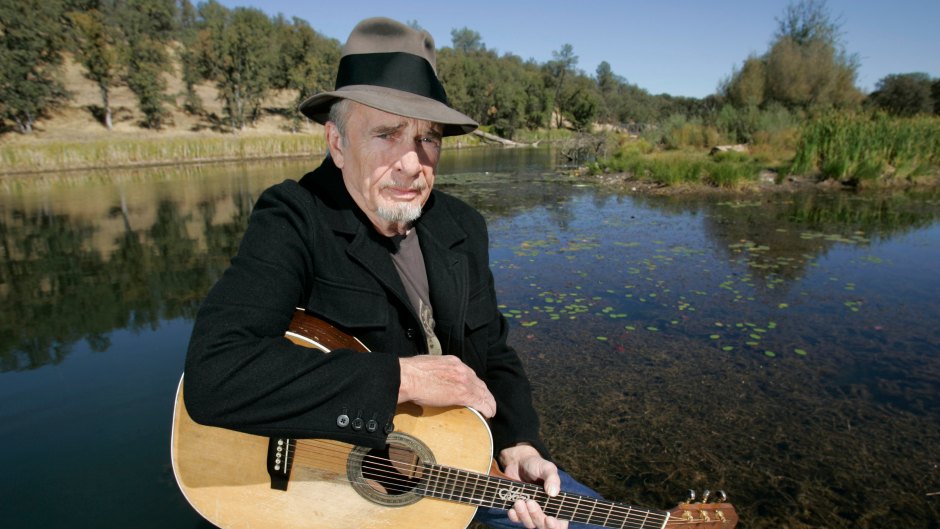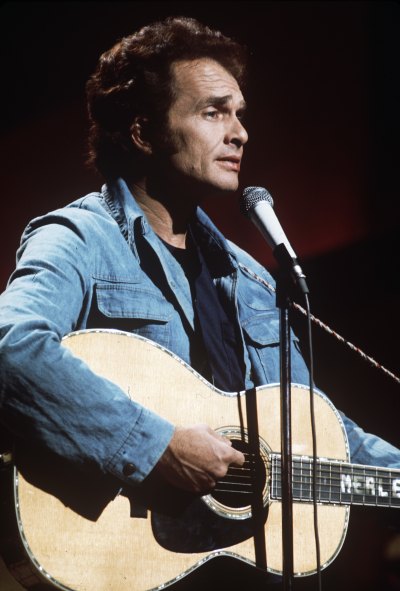
Rich Pedroncelli/AP/Shutterstock
Merle Haggard Blamed Himself for His Father James’ Death: ‘He Became the Symbol of Rebellion’
Even as a young boy, Merle Haggard yearned to be on the road. “I was 11 years old when I first hopped a freight train,” the original bad boy of country music once said. “It was just some inner yearning that I didn’t really understand then and probably can’t explain now, that caused me to jump those freights in search of something.”
It took Merle, who died in 2016 on his 79th birthday, a lifetime to come to terms with what he was seeking: redemption.
According to Marc Eliot, author of the new biography The Hag, “Merle blamed himself for his father’s death.” He was just 9 when it happened, and that tragedy became the defining moment of his life, leading him to youthful rebellion and three years in San Quentin State Prison. Merle drew on his past to create his songs and became a legend, but through years of hard living, five marriages and 38 No. 1 country hits, he sought peace.
“Merle never became the symbol of the underdog,” Eliot exclusively tells Closer Weekly, on newsstands now. “He became the symbol of rebellion.” Still, his struggle and the songs that came from it changed country music. “He brought a sophistication and intensity that it didn’t have,” Eliot explains. “He reshaped it, he reformed it. And he put Bakersfield on the map.”

Merle was born in that California city in 1937, two years after his parents relocated from Oklahoma. He was musical from birth, often singing, Eliot says. “Merle used to come onto the big easy chair and sit on his [dad’s] lap and listen to music.” But his life turned dark when he found his father half-paralyzed by a stroke in that chair.
Soon, the boy began hopping trains and stealing. After several arrests, and a teenage marriage to Leona Hobbs, Merle landed in San Quentin. “That judge had it in for him because he’d seen him so many times,” Eliot explains. Merle never forgot the horrors he witnessed while incarcerated. “God, that does something to a man’s mind that never heals up right,” he said.
Merle’s life took another turn, though, when he saw Johnny Cash perform at San Quentin in 1959. That convinced Merle to get serious about music. “He knew he could do it after he saw Cash,” Eliot says. “Here was a guy who did it, who also came from nothing.” Merle started performing upon his release from San Quentin in 1960, and four years later, he had his first hit with “Sing a Sad Song.” In 1969, “Okie From Muskogee,” a tribute to his dad, hit No. 1.
Years later, Merle began to understand what had been driving him all along. “I think what I’ve always looked for in life is my father’s approval,” he said. “That was the biggest thing I was robbed of. And it took me down many paths. It motivates you to do what I did. … Always making a new record, always writing another song. Who knows? It may have inspired everything.”
—Lisa Chambers, with reporting by Amanda Champagne-Meadows
For more on this story, pick up the latest issue of Closer magazine, on newsstands now.






































